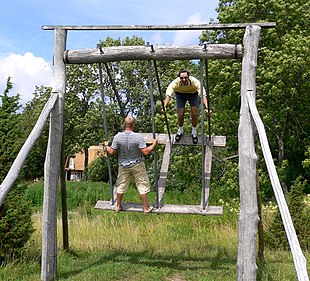fun

Fun is one in German since 16./17. Century documented noun formation from the Italian spasso "diversion, pastime, pleasure". The word was initially written as Spasso , based on the Italian original . Today, something is fun to describe an activity that is gladly done, that gives pleasure , although this is usually more sustainable. Having fun with someone means playing a prank on that person . Fun is an expression that can, should be, laughed at, and is considered part of humor . The word is also used synonymously for joke, joke and joke . Associated adjectives are fun and funny. Seriousness is the opposite term .
definition
Fun is the pleasure that comes with doing something.
Problem of writing
The rule of the reformed spelling that after a short vowel there is no Eszett , but ss is written, leads to difficulties when having fun (as with some other words) because the pronunciation in the different German-speaking regions varies between long and short. However, the official spelling in Germany is fun . In Switzerland it is always fun because the letter ß is not used . The official spelling of the word in Austria is also fun , but the spelling fun is also allowed.
Composite formations
In the course of the centuries, numerous compounds emerged, some of which have disappeared today or are only used dialectically: Funette ( little jokes), fun laberln or G'spaßlaberln (beautiful breasts). The Jester (a rogue , rogue or joker ) as funny and witty fellow has survived since the 18th century. The fun society, on the other hand, did not appear as a linguistic construct until the 1990s and was included in the dictionary in 2004 . On the other hand, a person who slows down others' enjoyment of something by referring to problematic aspects, lack of humor or excessive seriousness is referred to as a fun brake.
Related words
In the Oeconomischen encyclopedia of Johann Georg Krünitz the fun is carefully by the Posse Divorced:
"[...] a word that is only used in common life, and in the confidential way of speaking, to designate every joke, and in this way this word is also related to posse, only that fun is more limited to a familiar circle, more in his nature is in tight circles, and farce belongs more to public life. [...] "
Afterwards, the Economic Encyclopedia provides detailed explanations about jokers, jokers, buffoons, buffoons, jesters, jesters . In terms of meaning, fun can be distinguished from joy in that the former is more entertaining and the latter more sustainable. Example: Telling or hearing a joke or enjoying a comedy broadcast is fun, playing / mastering a musical instrument or the like is fun.
Fun and serious consideration
A common companion to fun is the requirement to avoid it. So Fritz Mauthner in Sprach und Logic (1913), when he regards the sentence about contradiction and the sentence about excluded third as profound nonsense and demands: Let us leave the logical tricks and other jokes aside, […] .
literature
- spasz, m. joke, entertainment, pleasure. In: Jacob Grimm , Wilhelm Grimm (Hrsg.): German dictionary . tape 16 : Sea life – speaking - (X, 1st section). S. Hirzel, Leipzig 1905, Sp. 1958–1964 ( woerterbuchnetz.de ).
Web links
Individual evidence
- ↑ Duden | Fun | Spelling, meaning, definition, origin. Retrieved April 14, 2020 .
- ↑ Fun, Austrian fun, too. In: Duden . www.duden.de, accessed on September 28, 2013 .
- ↑ DWDS - Digital Dictionary of the German Language. Retrieved April 14, 2020 .
- ↑ fun. In: Johann Georg Krünitz: Economic Encyclopedia . Volume 156: Sunday - Soapstone. 1833, p. 488 ( kruenitz1.uni-trier.de ).

